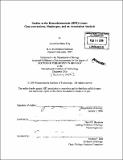Studies at the hemochromatosis (HFE) locus : gene conversions, haplotypes, and association analysis
Author(s)
Kamihara-Ting, Junne
DownloadFull printable version (10.46Mb)
Other Contributors
Massachusetts Institute of Technology. Dept. of Biology.
Advisor
David E. Housman.
Terms of use
Metadata
Show full item recordAbstract
Haplotype-based association studies offer an exciting potential methodology for the identification of genes that contribute to complex traits. There is thus great interest in understanding the biological forces that shape haplotypes. We have studied a well-characterized genetic locus surrounding the gene responsible for hereditary hemochromatosis (HFE) to investigate the impact of meiotic recombination events upon haplotype structure in this region. First we identified crossover hotspots in order to define the boundaries of haplotype blocks in this locus. We then found that gene conversion events play a significant role in shaping haplotype structure within these haplotype blocks. These gene conversion events were not limited to recombination hotspots and occurred with a frequency as high as 1 in 104 per site per generation. Gene conversions lead to the creation of new haplotypes and we suggest that they are important for the spread of disease alleles in a population. In addition, we discuss how these events can be used as important tools in haplotype-based association studies. We also present an association study in a large Venezuelan cohort to search for genes that contribute to residual age of onset in Huntington's disease. We demonstrate significant association between multiple alleles in a region on chromosome 6p21.3. (cont.) We identify two candidate genes in this region, HFE and histone Hlt and demonstrate significant association of this region with age of onset in a male-specific model.
Description
Thesis (Ph. D.)--Massachusetts Institute of Technology, Dept. of Biology, February 2006. Includes bibliographical references.
Date issued
2006Department
Massachusetts Institute of Technology. Department of BiologyPublisher
Massachusetts Institute of Technology
Keywords
Biology.